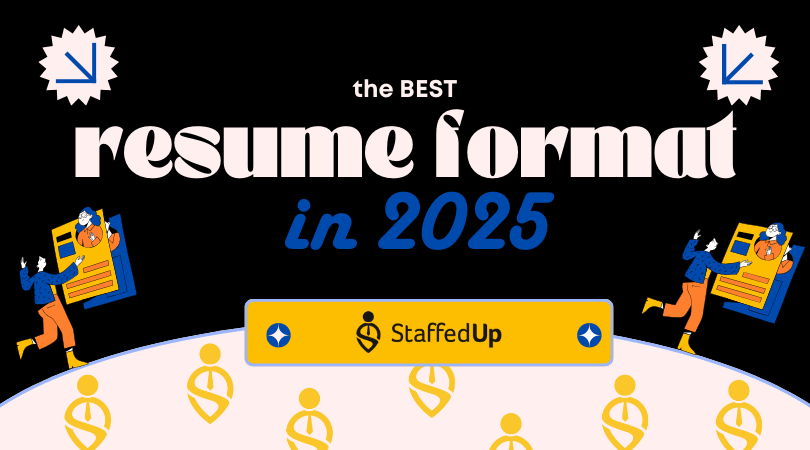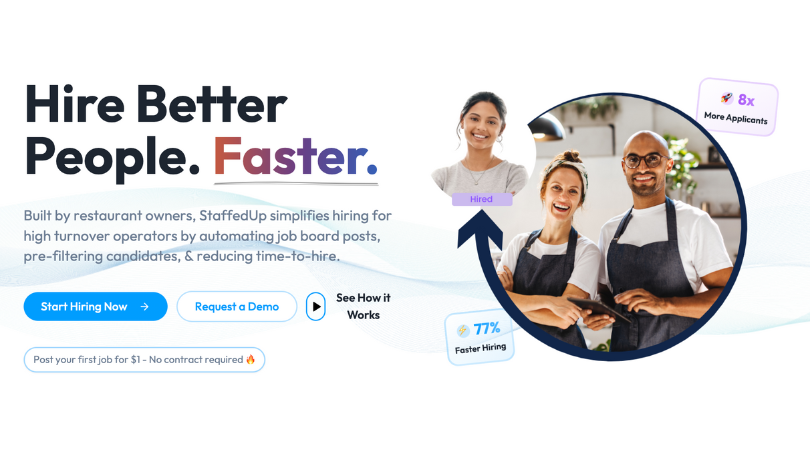
The Best Resume Format for Hospitality Roles in 2025
You spend hours perfecting your resume—tweaking the font, rearranging bullet points, adding the perfect “about me” section—only for it to vanish into a black hole of unread applications. Sound familiar?
If you’re applying for hospitality jobs in 2025, the reality is this: your resume isn’t just competing with other applicants. It’s competing with ATS software (Applicant Tracking Systems) that screen resumes before a human even sees them, overworked managers with stacks of applications, and employers who need to hire fast.
In an industry where managers are juggling staff shortages (managing staff shortages in hospitality), a poorly formatted resume can get you cut from the running in seconds. The fix? Choosing the right resume format that gets past the tech and speaks directly to the person making the hiring decision.
In this guide, we’ll break down:
- Why format is the secret weapon for landing hospitality interviews.
- The top formats that actually work in 2025 (and the one that doesn’t).
- How to tailor your resume for maximum impact in hotels, restaurants, and events.
- Pro tips to beat ATS filters and catch a hiring manager’s eye.
Why Resume Format Matters More in Hospitality Than Other Industries
Hospitality hiring moves at warp speed. Managers might post a role in the morning and be interviewing by that afternoon. The best candidates are often hired before the job listing is even closed.
This pace creates three big challenges for job seekers:
- Time-Starved Reviewers – Many hiring managers are reviewing resumes between guests, during prep, or on a quick coffee break. If they can’t scan yours in 10–20 seconds, you’re done.
- High Applicant Volume – Hospitality is one of the most competitive industries for entry-level roles. For every server job, a manager may get 100+ resumes.
- ATS Filters – Even small hospitality businesses are starting to use applicant tracking systems (what is an ATS?) to screen candidates before human review.
In this environment, a clear, ATS-friendly resume format is non-negotiable. It’s the difference between landing in the “call for interview” pile or being deleted before anyone even reads your name.
The 3 Best Resume Formats for Hospitality Roles in 2025
Let’s start with the one that wins for the vast majority of candidates.
1. Reverse-Chronological Format ✅ Best for Most Hospitality Pros
This is the gold standard. It lists your most recent job first, then works backward through your work history.
Why it works in hospitality:
- Relevance is instant. Managers see your most recent hospitality role without scrolling.
- Growth is visible. Promotions and increasing responsibilities jump out.
- ATS-friendly. Clean structure means better keyword scanning and fewer parsing errors.
Example layout:
- Contact Information
- Summary or Objective
- Work Experience (most recent first)
- Education
- Skills
- Certifications
Pro Tips:
- Keep it one column and avoid sidebars—many ATS systems read left to right only.
- Use bullet points that start with strong action verbs: “Managed,” “Coordinated,” “Increased.”
- Quantify results: “Increased average check size by 15%” is stronger than “Upsold menu items.”
2. Combination (Hybrid) Format ⚖️ Best for Career Changers or Entry-Level Applicants
The hybrid format blends a skills-first section at the top with a traditional reverse-chronological work history below.
Why it works:
- Skills upfront: If you’re new to hospitality, you can highlight transferable skills (customer service, cash handling, event planning) before your work history.
- Balanced: Hiring managers still see your work history, so it’s not a functional resume in disguise.
Best for:
- Students entering hospitality for the first time.
- Professionals transitioning from retail, sales, or other service industries.
3. Functional Format 🚫 Why to Avoid in 2025
A functional resume organizes content by skill type rather than job history. It’s tempting for those with career gaps, but it’s risky in hospitality.
Drawbacks:
- ATS Issues: Many tracking systems misread functional layouts.
- Suspicion: Hiring managers may assume you’re hiding something.
- Slower Scanning: Without clear dates and titles, managers have to dig for relevant info—and often won’t bother.
If you want to highlight skills, choose the hybrid format instead—it gives you the best of both worlds.
Core Elements Every Hospitality Resume Needs
Regardless of format, your hospitality resume should be built around clarity, relevance, and results.
Here’s your checklist:
- Tailored Summary/Objective – 2–3 sentences that name the role you’re applying for, showcase hospitality-specific skills, and include a measurable achievement. Example:“Customer-focused bartender with 5+ years of high-volume experience, known for upselling premium cocktails and improving guest satisfaction scores by 18%.”
- Relevant Skills Section – Balance hard skills (POS systems, reservation platforms, banquet setup) with soft skills (multitasking, conflict resolution).
- Achievement-Driven Experience – List not just duties, but results. Instead of “Handled cash register,” say “Processed $5,000+ in daily transactions with 100% accuracy.”
- Certifications – Include relevant credentials like ServSafe, TIPS, Certified Hotel Administrator (CHA), or state food handler permits.
- Clean, ATS-Friendly Formatting – Avoid tables, graphics, and unusual fonts. Stick to 10–12 point Arial, Calibri, or Times New Roman.
- Length – One page for entry-level; two pages only if you have 10+ years in the industry.
How Resume Format Impacts ATS Performance
Applicant Tracking Systems are becoming the norm in hospitality, especially for chain restaurants, hotels, and event venues.
Here’s how to make your resume ATS-proof:
- Match keywords from the job description (e.g., “front desk,” “banquet service,” “POS system”).
- Spell out acronyms at least once: “Point of Sale (POS).”
- Keep section headers standard: “Work Experience,” not “Career Adventures.”
- Avoid placing key info in headers/footers—ATS often skips them.
Want the full breakdown? See our guide: What is an ATS and why does it matter for hospitality?
Case Study: From Overlooked to Hired in 10 Days
When Maria, a bartender with five years of experience, first applied for jobs in 2024, she used a functional resume focused on skills. She rarely heard back.
After working with a recruiter, she switched to a reverse-chronological format, added measurable results (“Increased bar sales by 25% through targeted upselling”), and tailored her summary for each job posting.
The results:
- 3x more callbacks within the first two weeks.
- Two interviews scheduled in the same week.
- A higher-paying offer from a hotel lounge within 10 days.
Maria didn’t change her skills—she changed her format.
Common Mistakes That Hurt Hospitality Resumes
Even the right format can fail if you fall into these traps:
- Overdesigning: Graphics, columns, or fancy fonts that ATS can’t read.
- Generic Objectives: “Looking for a challenging role” says nothing about hospitality.
- Listing Duties Instead of Achievements: Employers want to know what you accomplished.
- Typos and Errors: In customer-facing industries, attention to detail is critical.
- Too Much Personal Info: No need for your age, marital status, or headshot (unless applying outside the U.S.).
FAQs: Hospitality Resume Formats in 2025
What’s the best resume format for hospitality jobs?
Reverse-chronological is best for most roles. Combination works for newcomers or career changers.
Should I include an objective or summary?
Yes—tailor it to hospitality and include measurable results.
How do I make my resume ATS-friendly?
Keep formatting simple, use keywords from the job description, and avoid graphics.
Can I use one resume for all jobs?
You can, but you’ll get better results by tailoring for each application.
Your Resume is Step One—Make It Count
In hospitality, you don’t have weeks to wait for a callback. A well-formatted, hospitality-focused resume is your ticket to getting noticed faster and landing interviews.
When you’re ready to put it to the test, use StaffedUp to find your next hospitality role—or, if you’re an employer, to hire your next great team member.
Post your first job today or explore our hospitality hiring resources.





